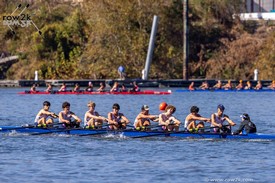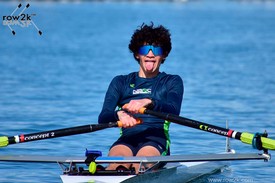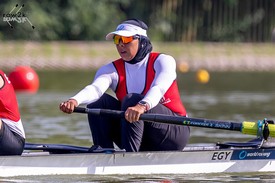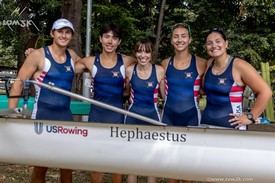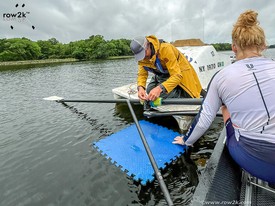The Sphinx of the Charles, re-examined
Toby Ayer's book about Harry Parker offers a new portrait
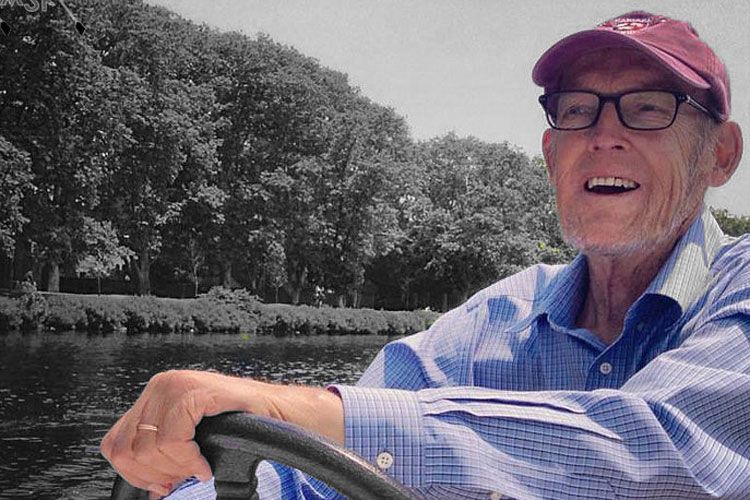
Legendary Harvard coach Harry Parker was many things to many people; mentor, rival, antagonist, and many more, and never simply a rowing coach. Parker was also almost famously unknowable, and in his 50 years of coaching at Harvard, from 1963 until his death in June of 2013, he left a trail of myth and legend alongside a long list of accomplishments.
Thus the title of Toby Ayer's new book about Parker, 'The Sphinx of the Charles' (189pp, Lyons Press, $22.95) is an appropriate one, as it examines both Parker's personal reticence alongside the apparent contradiction of such a supposedly distant person managing and leading a half-century of athletes.
Ayer is a rowing coach and teacher at the Salisbury School in Connecticut. An accomplished oarsman himself, at MIT and later at Oxford, Ayer draws on the observations and experiences of his year as an assistant coach with the Harvard heavyweight men primarily during the 2007-2008 season.
The book is divided into sections corresponding to the months of the season, and follows Parker and the Harvard men through fall racing, winter training, spring selection, and the racing and championship seasons. Interspersed throughout are Ayer's descriptions of the Harvard environment and training sessions, and descriptions of Parker's interactions with his athletes, assistant coaches, and family.
Ayer's writing style is lively, and he moves easily between in-depth "rower-ese" and readable explications of rowing and training minutia designed to reach non-rowers. Ayer also has a fine, spare sense of humor that infuses the book with an occasional light touch, which keeps the book grounded and away from veering into straight reportage.

Though somewhat light on deep technical details, the book lifts out a few key details that will doubtless intrigue anyone interested in modern rowing history. A case in point is Ayer's treatment of seat-racing, the modern form of which Parker is widely credited with popularizing in the early 1970s.
"Harry used this system to select the US national team crews in 1972, and the following year he wrote an explanatory note in Oarsman magazine," writes Ayer. "While traditionally a coach might have run time-trials with different versions of a full lineup, Harry posited that the rowers would feel more empowered, more in control of their own fate, if they are compared individually."
This, in a nutshell, was Parker's core approach to his athletes; offer them the possibility of high achievement if they followed his guidance. Of course, even then, not everyone was buying it, and Ayer relates coach and '64 Olympic M8+ gold medalist Emory Clark's rejoinder to Parker's seatracing approach.
"Clark declared that his 'great respect for coach Parker was still intact and so was his secret.' Considering all the variables that must be weighed in addition to the measurable race margins, Clark advised the oarsman who is being seat-raced to 'kiss your momentarily inflated sense of control good-bye.' Harry's article confirmed for Clark that ultimately, 'coaches liken themselves unto the Deity and do exactly what they bloody well please.'"
No matter which side of the seat-racing results they landed on, Ayer's book documents the profound influence that Parker had on his athletes. Appearing throughout the book are recollections from former Harvard oarsmen and coxswains, spanning the Parker years from the early 1960s to the end of his career. In these reminiscences and mini-essays, the writers attempt to quantify the impact that Parker has had on their lives, both as a person and a personage, and it's to Ayer's immense credit that he includes in these recollections pieces from athletes who don't see themselves as unalloyed acolytes of Parker.
Acknowledging that Parker could be difficult to get along with does nothing to diminish the scope of his accomplishments; on the contrary, it completes the picture of a competitive man, who, in addition to being a formidable coach was known to carry his competitiveness off the water to games of golf, croquet, and, of all things, the board game 'Monopoly.'
The book will likely not do much to quell the hunger of those readers who are looking for either a deeply technical description of Harry's training methods, his preferred rowing technique, or any singular description of what it was that made his crews so successful over the years. Likewise, the book does not set out to definitively define 'Harry Parker,' the person. Ayer says as much in the afterword.
"I never intended to write a biography, and at [Parker's] memorial service I was reminded why," he writes. "More than once I heard the view that everyone saw their own Harry Parker over the years. Who was this man? I will not be the one to explore that."
This of course is not intended as an excuse, and Ayer has done very well to capture a full picture of Parker and Harvard crew in the context of a single season.
Of course it is a huge irony, given Parker's tremendous competitive record at Harvard, that both Ayer's book and the other most recent book about Harry Parker and Harvard crew, Susan Saint Sing's "In the Rhythm of the Eight, A season with Harvard Crew" are both based on what was, statistically speaking, one of the worst seasons for a Harvard Varsity eight on record; without intending to impugn the oarsmen involved, the 2008 Harvard varsity was the first Crimson V8 to miss the Grand Final at the EARC Sprints in 48 years, and finished only 10th at that year's IRA Regatta, a poor showing by Harvard's more recent standards.
In any event, though they both pivot on the same season, Ayer's book outstrips the earlier volume in both scope and insight. One can only imagine how Ayer's book (and indeed, Saint Sing's) might have been different if they had chronicled some of the more spectacular recent Harvard seasons, say the triple IRA winners from 2003-2005, or the 2012 or 2013 varsities. Would the Harry Parker we learn about from these books have been any different?
It's also possible that the rowing world might learn the most from Parker during a year when he (and Harvard) were not winning at their accustomed stratospheric levels; Ayer is respectful but not shy in sharing vignettes of Parker at his most emotional, after losses, at season-ending banquets, and at those moments when the mantle of leadership probably rested most heavily (and publicly) on him.
Toby Ayer has written a fine book capturing not only Harry Parker and Harvard Men's crew during a single competitive season, but placing Parker and his achievements within the tapestry of many of those whose lives he molded, influenced or stamped in some form or another along the way.
You can purchase Ayer's book here.
If you enjoy and rely on row2k, we need your help to be able to keep doing all this. Though row2k sometimes looks like a big, outside-funded operation, it mainly runs on enthusiasm and grit. Help us keep it coming, thank you! Learn more.
Comments | Log in to comment |
There are no Comments yet
| |
- Bont Rowing
- Calm Waters Rowing
- Concept 2
- Craftsbury Sculling
- The Crew Classic
- CrewLAB
- Croker
- Durham Boat Co.
- Empacher
- Faster Masters
- Filippi
- Fluidesign
- h2row.net
- HUDSON
- Live2Row Studios
- Nielsen-Kellerman
- Oak Ridge RA
- Peinert Boat Works
- Pocock Racing Shells
- Race1 USA
- RowKraft
- Rubini Jewelers
- Vespoli USA
- WinTech Racing
- Bont Rowing
- Calm Waters Rowing
- Concept 2
- Craftsbury Sculling
- The Crew Classic
- CrewLAB
- Croker
- Durham Boat Co.
- Empacher
- Faster Masters
- Filippi
- Fluidesign
- h2row.net
- HUDSON
- Live2Row Studios
- Nielsen-Kellerman
- Oak Ridge RA
- Peinert Boat Works
- Pocock Racing Shells
- Race1 USA
- RowKraft
- Rubini Jewelers
- Vespoli USA
- WinTech Racing





